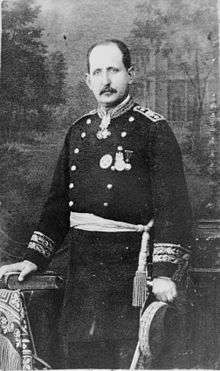Ramón Corona
Ramón Corona (18 October 1837, Tuxcueca, Jalisco, Mexico – 11 November 1889, Guadalajara, Jalisco) was a liberal Mexican general and diplomat.
| Ramón Corona | |
|---|---|
 | |
| Died | 11 November 1889 |
| Occupation | General and diplomat |
Biography
He was in business in his native town, but had to leave the place on account of persecution by Manuel Lozada, a caudillo, who became a kind of independent ruler in the Tepic territory. Corona joined the liberals, entered the army, soon obtained the rank of general, and fought against the army of Maximilian, especially in the western states, and the French troops never became masters of that part of the country. Corona organized the Army of the west, 8,000 strong, in 1866, and crossed the country, defeating the French in many encounters. He reached Querétaro, participated in the siege, and, after the final victory of the Mexicans, Maximilian surrendered to him on 15 May 1867. The republic having been reinstated, President Benito Juárez gave Corona a high military office, with residence at Guadalajara.[1]
At that time Lozada, thinking to subjugate the whole nation, organized an army of 16,000 men, and issued a proclamation to his troops, telling them to expect no compensation but what they could get from the vanquished towns. On 28 January 1872, at daybreak, began a bloody battle, near Mojonera, between his forces and about 1,400 men under Corona. Lozada was routed, leaving over 3,000 dead on the field, while the rest of his troops dispersed. Next day Corona entered Guadalajara in triumph, after having saved that city from the army of plunderers, for which he was given the title of "Hero de la Mojonera."[1]
President Sebastián Lerdo de Tejada appointed him minister to Spain, where he remained twelve years. He returned to Mexico in 1884, and was put in command of the Federal army at Jalisco.[1]
Notes
References
- This article incorporates text from a publication now in the public domain: Wilson, J. G.; Fiske, J., eds. (1900). . Appletons' Cyclopædia of American Biography. New York: D. Appleton.
Further reading
- Torrea, J.M. (1945). El general de división Ramón Corona: excelsitud como ciudadano, como militar, como gobernante y como diplomático (in Spanish). Gobernador Constitucional del Estado de Jalisco.CS1 maint: ref=harv (link)
- Moreno, J.P. (1966). Ramón Corona. Cuadernos de lectura popular (in Spanish). Secretaría de Educación Pública, Subsecretaría de Asuntos Culturales. OCLC 947834078.CS1 maint: ref=harv (link)
- Jaliscienses, Programa de Estudios (1989). Homenaje a Ramón Corona: en el primer centenario de su muerte (in Spanish). Secretaría de Educación y Cultura, Programa de Estudios Jaliscienses. ISBN 9789686142747. OCLC 651512441.CS1 maint: ref=harv (link)